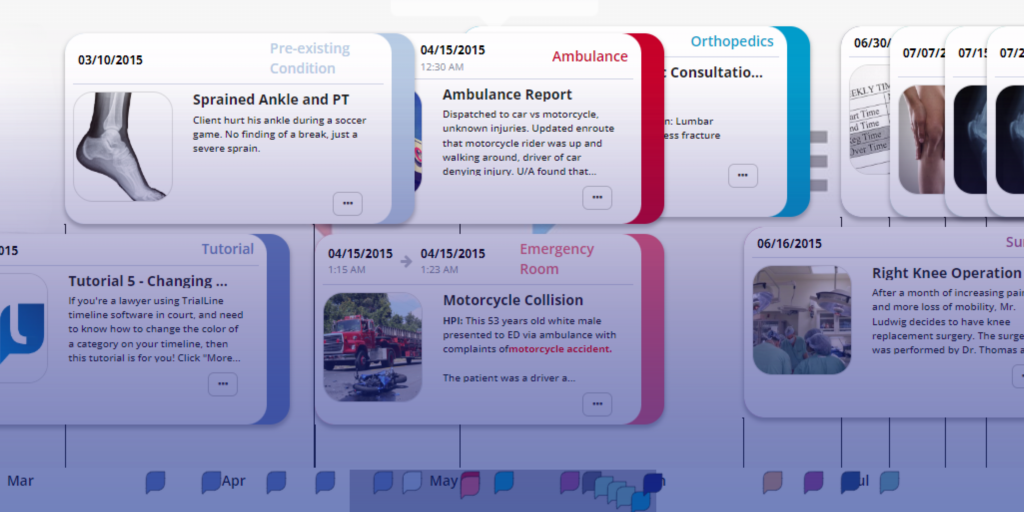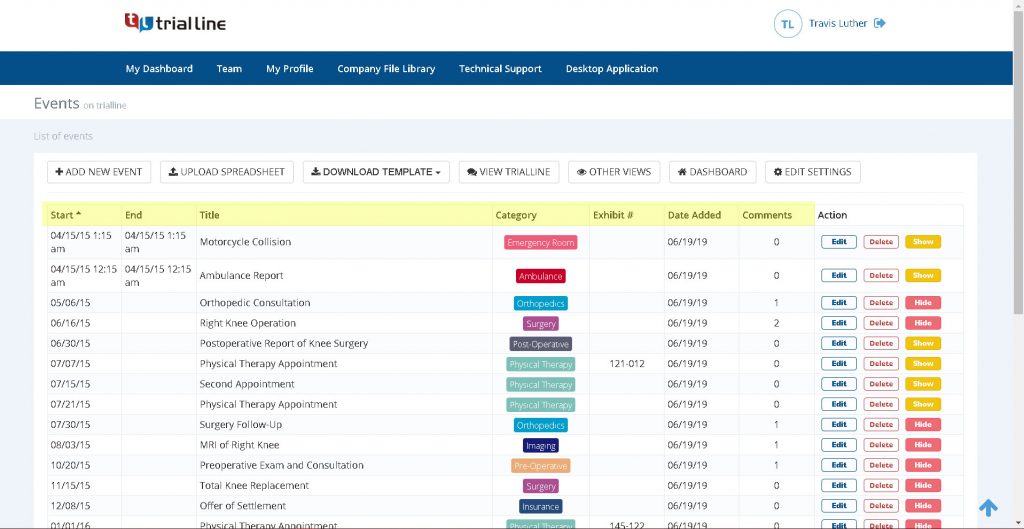Registered nurses have a less recognized career option as legal nurse consultants. Despite being less known, their role is just as crucial as those directly involved in healthcare interventions. Their daily responsibilities include examining medical records and creating medical chronologies to condense and highlight key points to support cases like medical malpractice, personal injury, or worker’s compensation.
However, the sheer volume and complexity of medical records can be overwhelming for nurse consultants. The extensive documentation is often filled with intricate medical jargon, diverse healthcare data, and a multitude of details. Thoroughly analyzing and extracting relevant information, from this vast array of records requires careful attention to ensure accuracy and relevance. Furthermore, the time-sensitive nature of legal proceedings adds pressure, making it challenging for a legal nurse consultant to efficiently navigate, review, and summarize these records within deadlines. In order to streamline and reduce the effort required to create these chronologies, legal nurse consultants are equipped with tools such as legal timeline software.
The Critical Roles of Legal Nurse Consultants

Registered nurses known as legal nurse consultants work with attorneys and other legal experts to serve as medical witnesses in cases like medical malpractice, personal injury, or workers’ compensation. They also offer their expertise in cases related to the cause of death or the manner in which a criminal act occurred. In addition, they also act as consultants for insurance and pharmaceutical companies, reviewing the records of patients requiring medication or making claims. These consultants provide valuable support to litigation teams by examining medical cases and thoroughly reviewing case files, including medical records, employment records, disability records, X-rays, and other pertinent information. Ultimately, legal nurse consultants play a crucial role in assisting attorneys, bringing a depth of expertise and authority that further strengthens legal cases.
Becoming a legal nurse consultant involves obtaining either an associate’s (ADN) or a bachelor’s degree (BSN) in nursing. Successful completion of the NCLEX examination is also necessary to become a registered nurse (RN) and establish the foundational knowledge and skills essential for excelling in this profession.
Some go further by earning an advanced degree in nursing and taking additional steps to deepen their knowledge and skills. Nursing professionals may also consider taking a post-master certification in forensic nursing to understand the legal system and progress in the legal nursing consulting field.
To understand the legal system and develop programs to advance as legal nursing consultants, nurses may take a post-master’s certificate in forensic nursing. Some also take extra steps by earning an advanced degree in nursing to deepen their knowledge and skills and earn better opportunities.
Understanding the Significance of Medical Chronologies

Medical chronologies are organized and detailed timelines that summarize a patient’s medical history and events in chronological order. They provide a comprehensive overview of the individual’s healthcare journey, including medical treatments, diagnoses, surgeries, medications, and other relevant information. These medical records chronology are often prepared by healthcare professionals, such as a legal nurse consultant or a medical record review consultant to facilitate a clear and concise understanding of the medical facts in legal cases.
Medical chronology reports perform several essential functions that help legal professionals assess and present the medical aspects of a case, such as
- Providing a clear and concise overview of a patient’s healthcare journey
- Facilitating a comprehensive understanding of the sequence of treatments, diagnoses, surgeries, medication, and other relevant factors
- Highlighting noteworthy points within a patient’s medical journey
- Providing a structural basis for legal arguments
- Enabling efficient communication between healthcare professionals and legal teams
Essentially, medical chronologies bridge the gap between medical information and legal proceedings, enabling a more knowledgeable and impactful presentation of medical details within the context of a legal case.
How to Prepare a Medical Chronology
Gathering Medical Records
A comprehensive medical chronology relies on the meticulous compilation of pertinent medical records. Legal nurse consultants must gather all relevant records to guarantee that the chronology report reflects a holistic view of the patient’s medical history. The thorough gathering of records serves to validate the accuracy of resulting chronologies and leaves no room for oversight.
Organizing Information Coherently
The cornerstone of creating an effective medical record chronology is organization. Once medical records are gathered, it becomes imperative for a legal nurse or medical records consultant to meticulously organize the collected information. This can be seamlessly achieved through the utilization of legal timeline or medical chronology software. By employing such tools, consultants gain the ability to categorize and arrange information coherently, providing a flow that aids both legal professionals and medical experts in understanding the case intricacies.
Creating a Chronological Narrative
When patient information is organized it is easy to tell the narrative behind a medical case, such as a malpractice or a personal injury case. Using trial presentation software to gather and organize data, medical consultants and legal professionals can identify pivotal events and establish the cause-and-effect relationships essential for legal arguments.
Medical chronologies serve as a foundation for any medical-related litigation, and the incorporation of case chronology software takes the practice to unprecedented heights. Proficiently crafting comprehensive chronologies empowers legal nurse consultants to not only enhance their efficiency but also make substantial contributions to the success of the cases they manage.
Building Compelling Medical Chronologies with TrialLine

Trialline distinguishes itself as user-friendly legal timeline software crafted to aid legal nurse consultants in developing medical chronologies. These chronologies offer a factual, concise, and informative overview of a patient’s medical treatment. The software empowers consultants to effectively fulfill their role, helping attorneys comprehend a client’s situation, the scope of injuries, and the corresponding medical treatments. This assistance proves valuable in settling a claim either pre-suit or during litigation.
TrialLine is a cloud-based tool designed for mediation, legal storytelling, and courtroom presentations that cater to the needs of both legal nurse consultants and attorneys.
Creating Medical Chronologies and Timelines

During the review and evaluation of medical records, legal nurse consultants can construct a medical chronology or trialline. This can be achieved either by sequentially creating individual events or uploading a spreadsheet containing all necessary information. This initiates TrialLine to automatically generate a medical or case timeline. Consultants may also categorize each event and add supplementary details by creating tags. These serve as filters, facilitating the efficient organization of patient information and the compelling presentation of the chronology.
Additionally, consultants have the option to attach specific details to each event, allowing for the identification and highlighting of potential areas of liability. This practice ensures that all relevant case material is aligned with a specific event, providing an immediate point of reference during presentation and review.
Viewing the Chronology in Different Layouts
TrialLine provides the flexibility to customize the layouts of your medical chronology according to your preferences. You have the option to choose from four layouts for viewing your medical chronology: Relative, Carousel, List of Events, and Pyramid.
Relative View is the primary view when creating a chronology and presents events in relation to each other based on their chronological order. Carousel, on the other hand, showcases each event in one of two rows, sequentially displayed one after another. With one up and the other below.
The List of Events presents all event data in a sorted list, organized by various headers. Pyramid View displays all entries in a row, with the events in the center elevated above the others, creating a visual pyramid effect as you navigate through the trialline.
Analyzing Quantity of Care in the List View
For a comprehensive visual presentation encompassing all forms of care, consolidate and exhibit all medical nursing events spanning thousands of pages using the List View in TrialLine.
This feature provides a detailed breakdown of medical interactions, including attachments to each underlying medical event within the chronology in a spreadsheet format. This is ideal for utilization in medical record review for attorneys, family conferences, mediations, or trial exhibits. Moreover, it provides valuable risk management, strategy identification, preliminary family meetings, and more before a court trial, providing consultants and counsel with an added advantage.
Specialized Views
You can generate specialized views from nearly any data in the medical chronology, enabling you to selectively share specific information with collaborators and contributors. This empowers you to create distinct views from all the details from the medical chronology, ensuring that only relevant information is shared based on individual roles. This precaution is taken to prevent biased or influenced opinions. This can be done by filtering out information you wish to withhold from a contributor.
By excluding particular categories or chats before sharing, you can filter the content you would like others to see. You may also activate the comments feature to allow contributors to express their thoughts on the specific you have shared and make necessary changes.
Key Takeaways
Legal nurse consultants bear the responsibility of organizing complex medical reports and aiding legal professionals in negotiating settlements for medical litigation. Their pivotal role involves streamlining the legal process by providing clarity to legal teams and offering counseling support.
While preparing medical chronologies for a legal team can be a laborious task, the use of medical chronology software, such as TrialLine empowers legal nurse consultants to construct comprehensive chronologies with all the necessary information essential to alter the course of a medical case.TrialLine is a specialized legal timeline software that not only facilitates the creation of chronologies for case events but also for medical information.
Trialline further eases the learning curve for uses by offering the option to schedule a demonstration, providing an opportunity to grasp the intricacies of preparing a medical chronology or legal timeline. Following the demonstration, users can sign up for a 14-day free trial, allowing for a hands-on experience before committing to the tool.
Enhance your chronologies and strengthen your case with TrialLine.
Disclaimer: The information provided on this website does not, and is not intended to, constitute legal advice; instead, all information, content, and materials available on this site are for general informational purposes only. Information on this website may not constitute the most up-to-date legal or other information.






